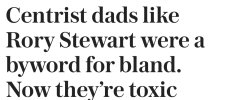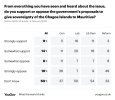well i assumed after outrage from the budget that jobs would be destroyed, there would be lower wages, increase in mortgage payments, inflation would go through the roof and the financial markets would crash .. not quite how it's turning out - in fact wages are going up higher than inflation, mortgages going down and people will have more money to spend and get the growth going.
the economy was never going to be turned around in 6/7 months with the economic polices the labour had to do.
Investments in AI, Nuclear, Infrastructure will also aid towards growth. Its looking rather positive.
Only worry is the tango Mussolini across the pond who is trying his best to destabilize the world - even then Starmer is handling that really well.
As someone who has been "buggering about" for want of a better phrase with Sizewell, Hinkley Point and Rolls Royce's SMR projects, its old news just being re-announced. Like the majority of the rail infrastructure projects, its a case of give it a slightly changed name or redo the feasibility stage and call it a new project. To be fair its the same game as the Conservatives played for the previous 5 yrs of office. Problem is most of the general public dont know or realise this, they dont think about the projects that are cancelled (e.g. A303 tunnel) when a shiny new one is waved infront of them.
The Lower Thames Crossing, already had £800m in planning/feasibility spent on it and whilst the commitment sound bite is welcome, they are still unclear how it will be funded and if it will be via a public private partnership or not.
The DfT, to put it simply, is in a bit of a mess and National Highways nor Network Rail have clarity on what schemes they can fund.
As regards interest rate cuts, yes its potentially good for business but it will need to be very slow and steady, so as not to drive inflation. Yes it may stimulate growth but in reality the UK needs is growth via productivity gains which require policy certainty and investment in infrastructure and technology.
Job losses well we wait to see, but it tends to be a lagging indicator by around 6 months after policy decisions are enacted. There are already recruitment freezes across various sectors and the number of jobs currently being advertised has fallen substantially. The UKs retail sector in particular looks most likely to see the largest staff reductions.
Personally Im willing to give them time, but some of the decisions so far have seemed at odds with their manifesto and public statements prior to the election, any more so that the Tories, probably not.
To claim a victory or defeat on any of their actions at this stage is still too premature, lets see where we are in 6 to 8 months time and if the growth indicators are more positive along with unemployment not increasing then Labour can rightfully claim some success.


